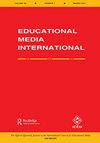Emerging Mobile Learning Pedagogy Practices: Using tablets and constructive apps in early childhood education
IF 1.4
Q2 EDUCATION & EDUCATIONAL RESEARCH
引用次数: 4
Abstract
ABSTRACT Early childhood teachers introduced mobile learning activities and educational software to the children's in-class learning activities. This qualitative study implemented one constructive creation app in two early childhood classrooms. It designed, implemented and evaluated the effectiveness of pedagogy practices (PP) for the meaningful implementation of constructive apps in an early childhood classroom. Two small groups of four to five years-old children engaged in weekly in-class research activities. Sixteen videos and 122 artifacts were analysed to determine each child's well-being, involvement, and motivation during the digital creation activities and evaluate the effectiveness of the implemented PP. The most effective PP embedded strategies that 1. enhanced the children's perceived autonomy, competence, and relatedness, 2. implemented a flexible and generous use of direct interactions between teachers and students, and 3. provided app operational habit-shaping routines that guided young children’s engagement with the mobile device and app. The implications of these findings are practical and theoretical. Teachers may use the transferable PP to guide their efforts to develop and implement digital creation activities in their early childhood classrooms. The findings of this study may also contribute the development of a mobile learning theory for young children and address a gap in the research literature.新兴的移动学习教学法实践:在幼儿教育中使用平板电脑和建设性应用程序
幼儿教师将移动学习活动和教育软件引入到幼儿课堂学习活动中。本定性研究在两个幼儿教室中实施了一个建设性的创作应用程序。它设计、实施和评估了教学法实践(PP)在幼儿课堂中有意义地实施建设性应用程序的有效性。两组四到五岁的孩子每周在课堂上进行研究活动。分析了16个视频和122个人工制品,以确定每个孩子在数字创作活动中的幸福感、参与度和动机,并评估实施PP的有效性。提高儿童感知的自主性、能力和亲缘关系;2 .灵活、慷慨地使用师生之间的直接互动;提供了应用程序操作习惯养成程序,指导幼儿与移动设备和应用程序的接触。这些发现的意义是实际的和理论的。教师可以使用可转移的PP来指导他们在幼儿课堂中开发和实施数字创作活动的努力。本研究的发现也可能有助于幼儿移动学习理论的发展,并解决研究文献中的空白。
本文章由计算机程序翻译,如有差异,请以英文原文为准。
求助全文
约1分钟内获得全文
求助全文
来源期刊

Educational Media International
EDUCATION & EDUCATIONAL RESEARCH-
CiteScore
3.20
自引率
0.00%
发文量
10
 求助内容:
求助内容: 应助结果提醒方式:
应助结果提醒方式:


